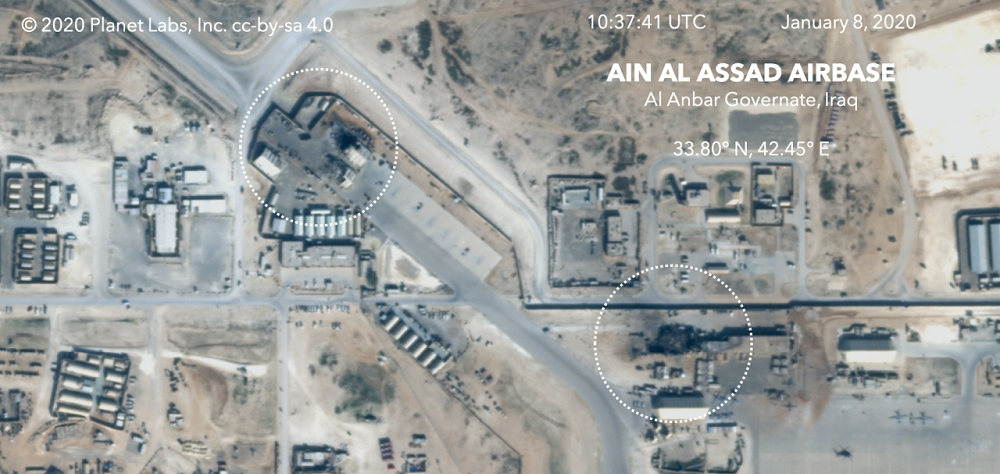Alwaght- Iran’s Islamic Revolutionary Guards Corps in early Wednesday morning fired 13 ballistic missiles on two American bases in Iraq in preliminary retaliation to the assassination of Iranian General Qassem Soleimani and Iraq’s Abu Mahdi al-Muhandis , the deputy head of Popular Mobilization Forces (PMF). The retaliatory strikes, apparently demanded nationwide, have left highly serious and decisive implications. Here are some of them:
Destroying US dignity and image
Two days before the Iranian retaliation, US President Donald Trump posted a string of tweets in which he bragged about the “powerful” and well-equipped US army all to inject fear into the opposite side and prevent the Iranian retaliatory actions. Certainly, there are countries in West Asia and other parts of the world that are afraid of the US even without its saber-rattling. However, Iran’s IRGC struck the American airbase ignoring the American propaganda with which the White House has been seeking hegemony worldwide for years. The Iranian missile attack on Ain Al-Asad (Lion’s Eye in English) military base which is the biggest and most-equipped American airbase in the region destroyed the US military image of power. The blow was so sizable that it does not seem the US can mend the damage easily and in the short term.
Showing Iran’s seriousness
Since the end of the Saddam Hussein war against Iran in the 1980s, in which also the US and Iran clashes limitedly, tensions remained present between Tehran and Washington. Whenever the Americans threatened with military action, Iran strongly warned of readiness to respond and also of grave consequences for the American forces in the region. For years, Iran found no specific ground to prove its firmness in a possible reaction. This chance was given last week when the US in a terrorist strike assassinated General Qassem Soleimani, the commander of IRGC’s Quds Force. Less than a week, Iran fired ballistic missiles into the American base making it clear that it is serious to respond to any violation and would not back down if threatened, even if the US is the violator.
Regional countries’ weight is revealed
Some of the regional countries, mainly the Persian Gulf Arab states, persistently paved the way for the presence of foreign powers mainly the US in the Persian Gulf. They enthusiastically and abjectly prepared for the Western military deployment, playing a destructive role in the regional order. These states violate the rights of regional nations and destabilize the region all to secure the Israeli interests and the illegitimate US presence. They make huge arms purchases from the US and use them against the regional nations and even at home both directly and directly while boasting of being the police force of the region. They in some cases threaten other regional states. Their cowardly approach to the anti-American retaliation disclosed their real weight in the regional equations and indicated that they not only alone but also with reliance on the US power are weak.
Increasing Israeli humiliation
The Israeli regime is experiencing tough times as the 2011 Islamic awakening promoted the anti-Israeli sentiments in the region and encouraged the Palestinians to raise even more strongly the demand of return to their lands and retake the occupied territories from the Israelis despite some Arab regimes overtly and covertly siding with Tel Aviv. A set of heavy Israeli defeats from resistant groups like Lebanese Hezbollah and Palestinian Hamas majorly curtailed the Israeli power to face the resistance movements. The fast demands of ceasefire with Hamas after a set of escalations bear witness to this reality. In a bid to regain strength and show off as a powerful player, Tel Aviv carried out raids on some of the Iranian forces’ positions in Syria. But even these attacks could not present it as a strong actor in Syria, though Iran opted to show strategic restraint. After the assassination of General Soleimani, the Israeli leaders, seeing the Iranian people’s fury and determination for “tough revenge” and also the Iranian strikes on the American bases in Iraq, are now more than even humiliated and frustrated. Their conservative stances after the missile strikes are the best proof.
Iran’s deterrence power grows stronger
As the American political circles say, the main reason Trump did not take military action against Iran after Iranian air defenses shot down the intrusive American drone over the Iranian territorial waters in June was his right understanding of the Iranian reciprocal action. Iran said that it would firmly respond to any US strikes. Trump’s refraining from a military action prevented him from testing an Iranian response at the time. The US gave Iran a chance to prove its deterrence power by assassinating its top general who for long years fought a range of Western-backed terrorist groups, on top of ISIS. By the missile strikes Iran proved that it has strengthened its power to deter threats.
The US decline to respond to the Iranian missiles proves the Islamic republic has gained deterrence power. Even a possible American response, which can drag the whole region into a war as Iran said its next responses will be even tougher, will not negate these implications. Additionally, Iran’s missile response in the near future will seriously influence regional cases like Iraq, Syria, Lebanon, Yemen, and Palestine.



























